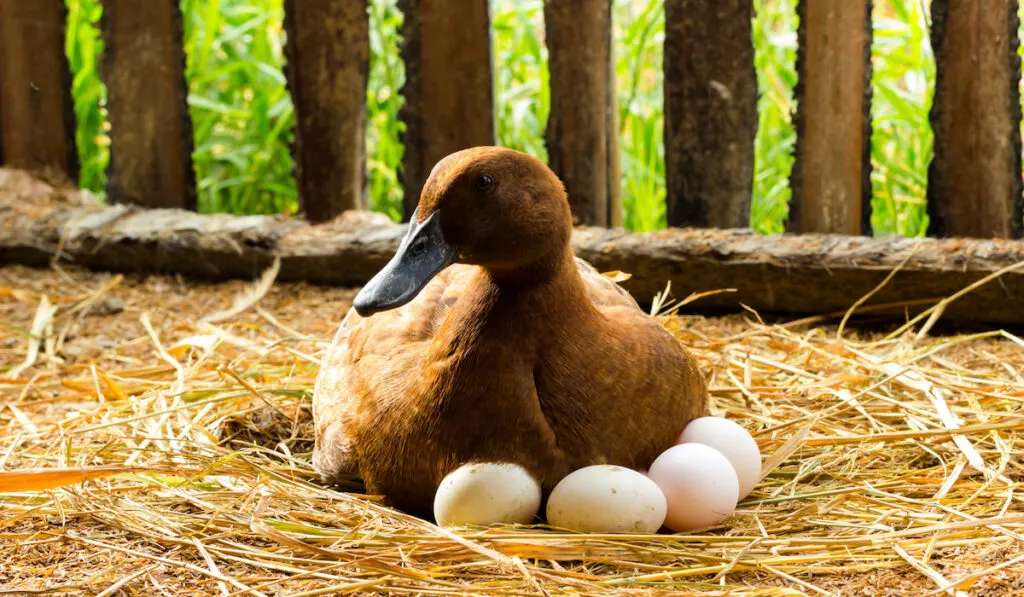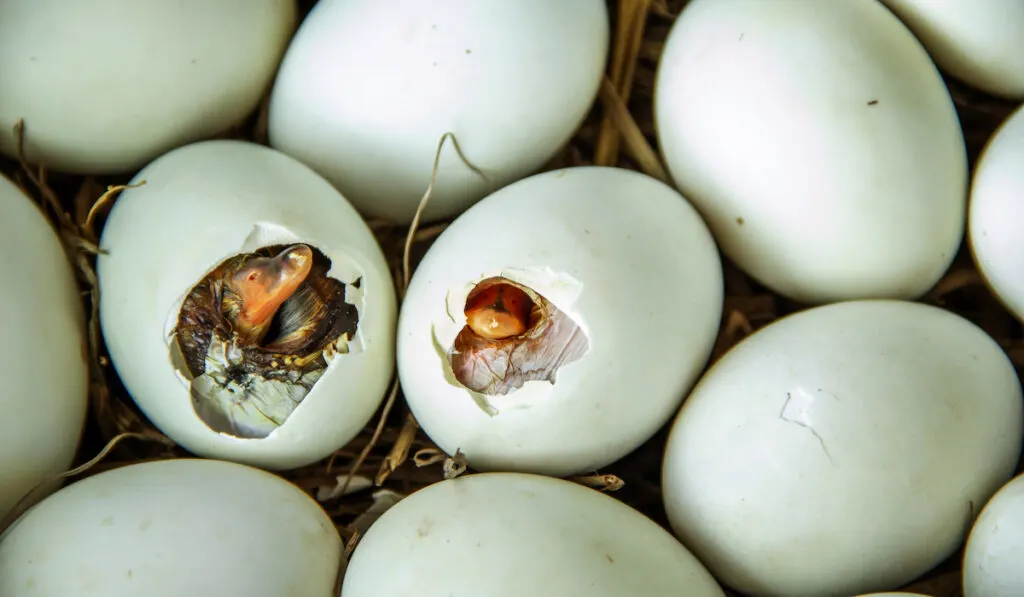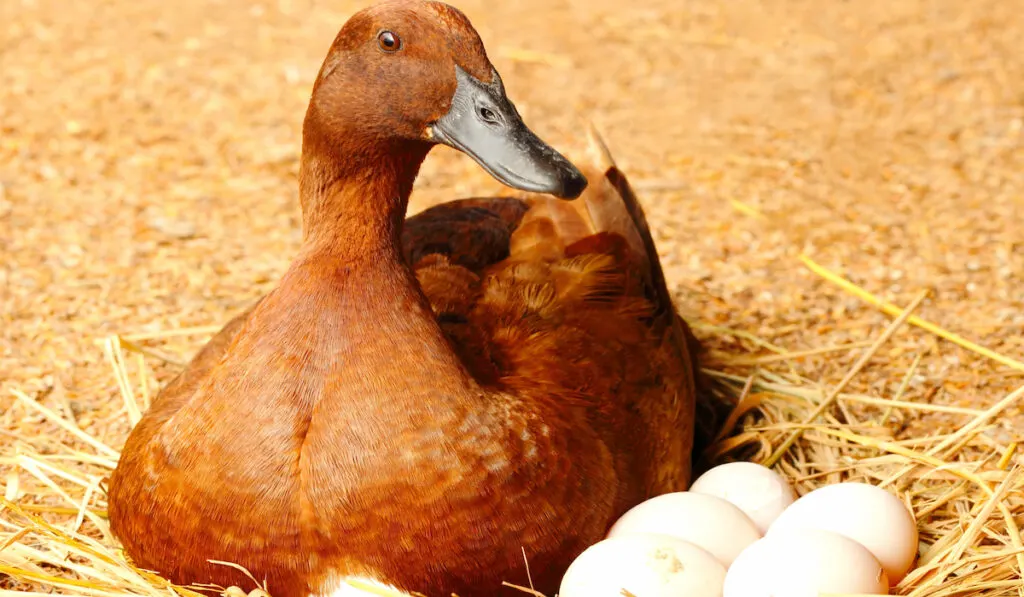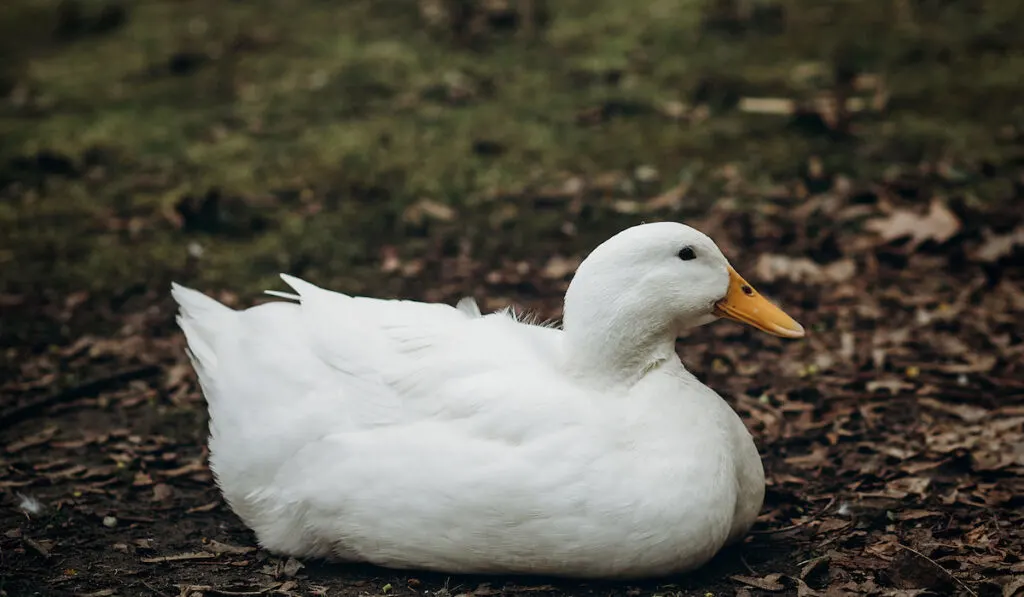It’s a given that not all eggs a goose lays will be fertile. In other words, there is always a chance that a goose’s clutch will contain bad (infertile) eggs.
Now, the question is, will a goose sit on those bad eggs? A goose may sit on bad eggs. On the other hand, it may abandon bad eggs. While some geese know when their eggs have gone bad, some (like new mothers) don’t. The likelihood of a goose leaving its eggs is higher when most or all of the clutch has gone bad.
There is more to the answer above. In the rest of this article, we discuss the readiness of geese to go broody on bad eggs. We also mention some other fun facts about goose incubation.

Table of Contents
Will a Goose Sit on Bad Eggs?
A goose may or may not sit on bad eggs – the reaction of geese to spoiled eggs varies from one individual to another. But there might be a pattern.
Inexperienced or new mother geese are more likely to sit on bad eggs than experienced mothers. Since it is their first time, they may not necessarily know when their egg has spoiled.
Also, if only a minor part of a goose’s clutch is bad, the goose might sit on the bad eggs alongside the good ones. Conversely, it is more common for geese to abandon their eggs when most of the clutch has gone bad.
All in all, abandoning bad eggs is a phenomenon common to most poultry, including geese, ducks, and chickens.
If you ever notice that your goose has abandoned its eggs, you should inspect the clutch. This way, you might be able to save the good eggs, if there are any.
You can verify whether an egg is good or bad by candling it. Generally, viable eggs will move in reaction to the candlelight, and their blood vessels are well-defined. Bad eggs, on the other hand, would be clear on candling if they are infertile.
However, if a bad egg was fertilized, it will show disrupted blood vessels on candling. The embryo will also be unresponsive to candlelight.
Other signs of a spoiled egg include a nasty smell and the exudation of a light-brown fluid.

9 Fun Facts About Goose Incubation
Incubation Period of Geese
Generally, geese incubate their eggs for around 28 to 35 days. However, the exact incubation period varies with the breed.
Smaller breeds are more likely to incubate for shorter periods – around 28 days. The heavier ones, on the other hand, have lengthier incubation periods – up to 35 days.
Geese eggs do not hatch all at once. Sometimes, it takes up to 3 days.
You may notice a tiny crack on the eggs when they start to hatch, but do not interfere. If you try to peel the eggs to help the gosling hatch, you may puncture the membrane and if this happens, the gosling may die.
Not All Goose Eggs Become Fertile
Under ideal conditions, an average of 9 out of 10 goose eggs will become fertile. The best conditions for breeding amongst geese include having the appropriate goose-to-gander ratio and providing an excellent feed ration. You should also have your geese and ganders together before breeding season.
With all of the above in place, 90% of your goose eggs should become fertile. Interestingly, in many cases, not all of the fertile eggs will hatch.
The Hatching Rate of Fertile Eggs Is Not 100%
Even under appropriate conditions, not all the fertile eggs in a clutch will hatch. The hatching rate is even lower when the eggs are incubated artificially.
When you incubate goose eggs artificially, the hatching rate can be as low as 40%.
Maintain the Same Temperature Throughout the Incubation Period
When incubating eggs from other poultry birds artificially, you may vary the temperature at different stages of the incubation period. However, for goose eggs, you should maintain the same temperature until they pip.
When incubating goose eggs with a forced air incubator, an incubating temperature of 99.5 degrees Fahrenheit is ideal. However, when using a still air incubator, 100.5 degrees Fahrenheit is desirable.
Once the eggs pip around day 26 – 29, reduce the temperature to around 97-98 degrees Fahrenheit. Doing this will help the goslings breathe better.
When goose eggs pip, goslings start breathing with their lungs. However, elevated temperatures will reduce oxygen levels. Hence, the need to reduce the temperature when the eggs pip.
Incubation Humidity for Goose Eggs
Generally, it is recommended that you keep humidity at 50-55% in the first 26 to 29 days of incubation. Then afterward, you raise the humidity to 75% for the rest of the incubation period.
Interestingly, the recommended values may be too high or too low, depending on your environment. You may have to run your incubator at lower humidity for your goose eggs in a humid climate.
When incubating your goose eggs, you should start with the recommended values (50-55% and 75%). However, as time goes on, you may have to adjust the humidity.
To know the best incubation humidity for your goose eggs, weigh them weekly. If they are losing weight too fast, increase humidity. However, if they are losing weight slowly, decrease humidity.
Overall, you should look forward to a 16% weight loss in the eggs during the incubation period.

A Goose May Not Sit on Its Eggs From the Start
In some cases, geese may not sit on their eggs from the start because they have not laid a sizeable number of eggs. They do this because they want all their eggs to hatch at once.
Geese typically lay an egg every 1½ – 2 days, and they usually become broody after laying a clutch of 12-15 eggs. So, a goose may not sit on its eggs until 18-24 days after producing the first egg in the clutch.
A Goose May Abandon Unhatched Eggs After the First Goslings Hatch
After their first goslings hatch, some geese leave the unhatched eggs behind. Instead of sitting on the unhatched eggs, they spend time teaching the new goslings how to feed.
If you ever experience this, retrieve the good eggs from amongst the abandoned ones, and incubate them artificially.
Goose Eggs Benefit From Misting and Cooling During Their Incubation Period
From their 8th day in incubation, you should start misting and cooling the eggs. This process simulates what happens when a wet mother goose returns to sit on her eggs after a swim. Misting and cooling also help raise the humidity around the eggs.
To mist an egg, get it out of the incubator and spray it with cool water lightly. Then after misting, let the egg cool for about 10 minutes before placing it back in the incubator.
Between the 15th and 21st days of incubation, let the cooling period extend up to 15 minutes. Then from days 22 to 25, let the cooling last for up to 20 minutes.

You Can Store Goose Eggs for a Few Days Before You Incubate Them
When you collect unhatched eggs from a goose, you can store them for a few days before incubation. You may store such eggs at room temperature for up to 10 days. But the hatching rate will be pretty low if you keep them this way.
Alternatively, you may store them in cold storage or refrigerator at 59-60 degrees Fahrenheit. Storage at low temperatures offers better chances of hatching.
During the storage period, ensure you turn the eggs through an angle of 180° at least 3 times daily. For the best outcomes, let the eggs lay flat on their sides while in storage.
Final Thoughts
Sometimes geese detect and remove bad eggs from their clutch. However, sometimes a goose may sit on bad eggs without realizing it.
If you ever notice that your goose has sat on its clutch for a period longer than the typical incubation period, check the eggs. There is a good chance that they may have spoiled, and if they have, discard them.
Resources
- https://familyfarmlivestock.com/will-a-goose-sit-on-bad-eggs/
- https://www.backyardchickens.com/threads/goose-egg-questions.347491/
- https://purrfectnpawesome.com/reasons-geese-abandon-their-eggs/
- https://poultrykeeper.com/incubating-and-hatching-eggs/candling-eggs
- https://www.backyardchickencoops.com.au/blogs/learning-centre/how-to-spot-a-bad-egg-in-the-incubator
- http://www.fao.org/3/AC802E/ac802e08.htm
- https://www.dpi.nsw.gov.au/animals-and-livestock/poultry-and-birds/species/geese-raising/egg-production
- https://www.incubators.org/goose-egg-incubation.html
